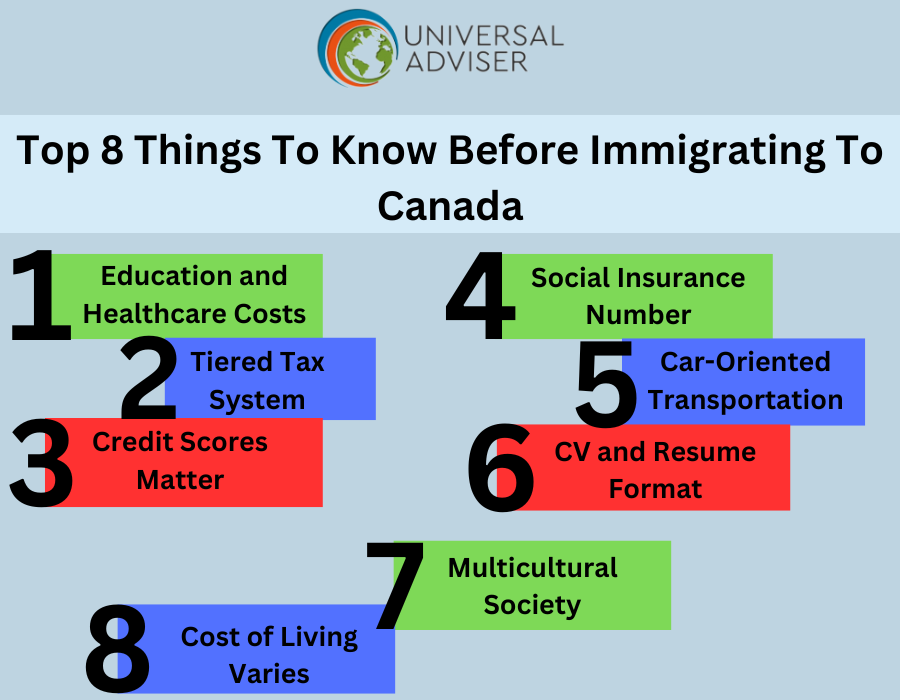Migrating to Canada is a dream for many, as it offers a high quality of life, a diverse culture, and abundant opportunities. Whether you’re seeking better job prospects, education, or simply a fresh start, Canada has much to offer. However, the journey to successfully settle in this beautiful country requires thorough planning and preparation.
From understanding visa requirements to adapting to cultural differences, there are key elements that can make or break your migration experience. In this blog post, we’ll explore eight essential things you need to ensure a smooth and successful transition to Canada.

8 Things You Need to Successfully Migrate to Canada
1. Prepare Your Passport and Visa
Your passport and visa are critical for your migration to Canada. The type of visa you need—whether for permanent residency, temporary stay, study, business, or self-employment—depends on the purpose of your move. Ensure your passport is valid for your entire stay and have copies of essential pages, including your personal details and passport number. Keep the original documents readily available for yourself and any accompanying family members.
2. Organize Immigration Documents
Having all your immigration documents in order is crucial before relocating to Canada. Keep these documents with you rather than packing them in your luggage. The specific paperwork required will vary based on the type of visa you have. For instance, a student visa requires an acceptance letter from a recognized institution, while a business visa does not. If your documents are not in English or French, obtain official translations, and keep original, photocopied, digital, or certified copies of all important documents to avoid delays or extra costs once in Canada.
3. Decide Where to Live in Canada
Choosing your place of residence before moving is key to a smooth transition. Consider the type of housing, monthly expenses, climate, and cost of living across various provinces. The province you select will impact job opportunities, quality of life, education for children, and cultural experiences. Research thoroughly to determine which province aligns with your needs, and secure accommodation before your arrival. Major cities like Toronto and Vancouver may require advance planning to find suitable housing.
4. Secure Employment
Finding a job is a critical part of your move. The Government of Canada’s Job Bank offers valuable resources, including job listings, market information, and resume tips. Use the National Occupational Classification (NOC) system to explore opportunities and understand job requirements, wages, and outlooks. If your profession is regulated, you may need to undergo a qualification recognition process. Prepare a Canadian-style resume and apply for jobs that match your skills and experience.
5. Ensure Financial Preparedness
Make sure you have enough funds to cover expenses when you first arrive in Canada. It may be helpful to order some Canadian currency before your move for immediate needs like transportation and meals. Opening a Canadian bank account is also advisable, and if you’re bringing more than $10,000 CAD (or the equivalent in your home currency), you must declare it to the Canada Border Services Agency.
6. Familiarize Yourself with Border Rules
Understanding Canada’s border rules and entry requirements is essential for a hassle-free arrival. This includes knowing the eligibility criteria, required documents, and customs regulations, such as what items you can bring and the duties or taxes on certain goods. Official government websites, like the Canadian Border Services Agency (CBSA) and Immigration, Refugees and Citizenship Canada (IRCC), provide up-to-date information to help you prepare.
7. Arrange Health Insurance
Health insurance is a crucial consideration. Canada’s publicly funded healthcare system covers essential medical services for citizens and permanent residents, but provincial health plans may not cover everything, like prescription drugs, dental care, or vision care. Consider purchasing private health insurance to cover these gaps, especially since provincial health coverage typically kicks in after 90 days. You might also explore Visitors to Canada Insurance for coverage during this period.
8. Improve Your Language Skills
Canada is a multicultural country with English and French as its official languages. While you might encounter people who speak your native language, being proficient in English or French is essential for effective communication and integration. Consider taking language courses or using online resources to enhance your language skills, particularly if you plan to live in Quebec, where French is predominant.
Conclusion
Canada offers a wealth of opportunities, making it a top destination for migrants worldwide. However, successful migration requires careful planning and preparation. By following these eight essential steps, you can ensure a smoother transition and start your new life in Canada with confidence.
